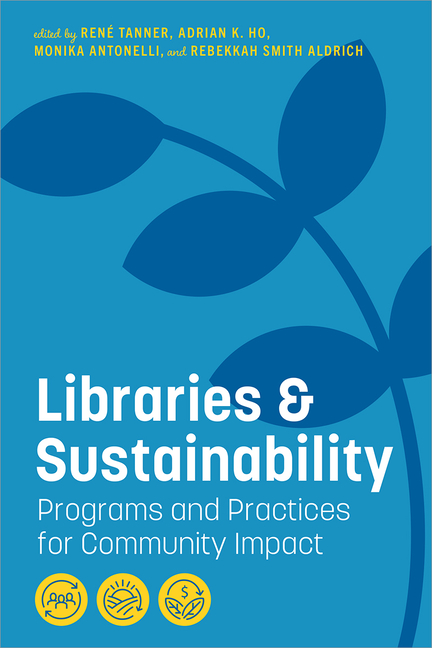The American Library Association’s Public Programs Office has chosen our latest book for their book club!

ALA has announced the “Libraries and Sustainability” Virtual Book Club, a series of three virtual, interactive conversations about incorporating sustainability into librarianship to be held in November and December 2022.
Library workers who would like to be considered for one of the 100 available spots should apply online by August 19.
Participation is free but limited to 100 participants. Participants will receive a free print or ebook copy of “Libraries and Sustainability: Programs and Practices for Community Impact,” edited by René Tanner, Adrian K. Ho, Monika Antonelli and Rebekkah Smith Aldrich (ALA Editions, 2021).
Participants will be expected to attend each of the three virtual book club sessions listed below and read the three corresponding chapters in advance. Sessions will not be recorded.
Applicants will be notified of their acceptance by September 5. Sessions will take place over Zoom; the link will be provided to participants once their registration is confirmed.
“Libraries and Sustainability: Programs and Practices for Community Impact” offers an easy-to-digest introduction to what staff at a range of libraries have accomplished in incorporating sustainability into their decision-making and professional practices. In addition, a discussion about the role of economics and sustainability will challenge readers to stretch in new ways to positively impact their communities.
The book club series consists of three 90-minute virtual book clubs. Each session will feature one chapter from “Libraries and Sustainability,” and will offer a live conversation with the chapter’s authors, small-group breakout discussion, and Q&A time with the authors.
Sessions will include:
Monday, November 14, 2022, 12:30 – 2:00 p.m. CST
“Libraries in the Doughnut Economy,” with Monika Antonelli, René Tanner, Rebekkah Smith Aldrich and Adrian K. Ho
The current challenges brought on by climate change require bold thinking and action to turn the tide. The authors will introduce the concept of “Doughnut Economics” and explore how library leaders can supercharge a just transition to an economy that is less extractive and puts the well-being of our fellow humans at the center of decision-making.
Participants in this session will:
- Understand the conceptual model of Doughnut Economics and how it can help libraries contribute to a sustainable and resilient society
- Explore the importance of the Knowledge Commons for a more just society
- Walk away with an understanding of how to think like a “21st-century economist”
Thursday, December 1, 2022, 12:30 – 2:00 p.m. CST
“Walking the Path to Sustainable Library Certification,” with Jill Davis, Jennifer Ferriss and Lisa G. Kropp
Being a sustainable library means using the triple bottom line of sustainability — environmental stewardship, social equity and economic feasibility — to guide decision-making at your library. From large decisions (e.g., how to operate your building sustainably or achieve buy-in from staff and stakeholders) to small decisions (which copy paper to buy), libraries can demonstrate leadership in the area of sustainability. Using this methodology makes for a library that lives its values out loud, treats its workers well, and is a strong community co-creator to ensure that residents thrive.
Participants in this session will:
- Understand how the triple bottom line of sustainability can be applied through library operations, service/program design and outreach
- Hear from three library leaders who have done this work and achieved Sustainable Library Certification status
- Walk away with an empowered mindset to be the change they want to see in the world
Wednesday, December 14, 2022, 12:30 – 2:00 p.m. CST
“Rapid Library Disaster Response and Recovery for Community Resiliency” Michele P. Stricker
A key element to successfully responding to a major disaster is the overall preparedness of individual citizens, families and the community as a whole. This session will provide an overview of tools to help library leaders overcome challenging disaster scenarios, mitigate risk, and focus on helping libraries rebound quickly from a disaster so their communities become more resilient.
Participants in this session will:
- Learn how to hone situational awareness to improve response decisions in the aftermath of a disaster
- Receive an introduction to disaster preparedness models that have been proven effective
- Walk away with a renewed focus to ensure communities thrive thanks to a library’s preparedness for the next disaster
